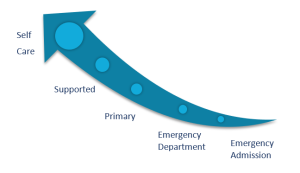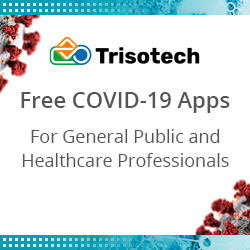Realising the potential of digital health services in the NHS
Blog: Capgemini CTO Blog
The NHS should innovate the traditional approaches to funding and contracting of primary care to allow digital services to thrive and provide beneficial outcomes to the service and patients.
Patient experience
Earlier this year I signed up to a digital primary care provider. The provider offers two levels of service, an AI consultation with a chatbot and/or a virtual consultation via a smartphone with a human GP. I’ve only used the service once but it worked incredibly well.
I woke up on a Tuesday with symptoms of a recurring, minor health issue that in the past needed a course of GP prescribed antibiotics.
Many of us that use a traditional ‘in-the-flesh’ human GP, will be aware that practice opening hours aren’t usually conducive to a ‘9am-5pm’ style job. So rather than calling my GP (or logging into my GPs digital appointment booking service) to find a suitable time for an available appointment (most likely to be scheduled for the weekend – 4 days away), I instead signed on to the app.
At 8.50am I booked an appointment for my lunch break at 12 noon. At 12 noon I spoke to the virtual GP for 20 minutes over a video call. She prescribed me the antibiotics and within minutes the prescription note arrived via the app. I was then able to select a pharmacy to collect the medicine from. At 5.30pm I left work and collected the medicine at the pharmacy 2 minutes from my office. Within the space of 9 hours I had achieved what may have taken 9 days through a traditional GP service.
And I’m not the only one moving towards a more digitally based GP. Last November, as part of an NHS trial, the digital provider ‘Babylon Health’ took over a GP practice in West London. 20,000 patients signed up in the first six months including the new Secretary of State for Health and Social Care, Matt Hancock.
Of course, there are limitations to such an online virtual GP model and not all of us will benefit or should be offered such a service. Yet for many of us who present with simple, routine issues, simply require quick, transactional services. For such cases digital technology lends a platform that can free-up capacity for human GPs.
Compatibility with the NHS as a health system
What would it take for standard GP practices to work in a similarly flexible manner? The answer lies in an innovative reassessment of their funding and contracting.
GP practices are funded on average £150 per patient. Healthier patients who attend less often effectively subsidise sicker ones. The BMA and the RCGP have accused digital providers of ‘cherry-picking’ the younger, easy-to-treat patients and leaving surgeries with the older, complex patients. Practices whose patients are moving to Babylon in West London stand to lose substantial amounts of money. Therefore, it remains to be seen how compatible digital service providers are with the present NHS provision.
Further compatibility issues come into focus when considering the scope of patients who are suited to digital services. As mentioned earlier, digital services are not suited for everyone. For patients who require care coordination and physical consultations, regulators are concerned about service provision and quality.
Last year the CQC criticised another digital consultation service ‘Push Doctor’ for being unsafe and ineffective. The report found that GPs working for the online service had prescribed high-risk medicine such as blood thinners without appropriate patient profiling. Indeed other digital services have failed CQC inspections. HR Healthcare Ltd. and MD Direct were suspended as they evidenced widespread failings in the provision of safe care.
However it stands to reason that some innovative thinking could easily prevent total alienation of digital services and allow for the technology to be deployed in a way that compliments standard provision and maintains patient safety. A reassessment of the funding model for GP practices, in part aimed at achieving this is underway.
An NHS England consultation document on proposed changes to the GP contract is clear on how it sees general practice developing: ‘By the end of the next decade digital technology is likely to have transformed general practice.’ The document says: ‘This means that a patient’s first point of contact with a GP is through a digital channel, not a face-to-face consultation, although the latter remains an option if required.’ The document adds these models are ‘increasingly common’, and will result in ‘greater convenience for patients’, as well as help to manage ‘increasing demand’.
It is encouraging that NHS is focused on modernising primary care to allow digital to thrive and provide beneficial outcomes to the service and patients.
Linking patients, activity and costs
Understanding patient profiles is the first step towards better service design and the appropriate deployment of digital technology. Digital services are not suited to all patients so how can we determine who will benefit from them? Capgemini’s Humanising Healthcare is a data-driven methodology that combines an understanding of patient demand data with performance improvement to transform patient experience.
Through data we truly understand the patient base of a care provider. We can segment and cluster cohorts of patients who differ based on their needs. It is at this point that digital services can be introduced to appropriate cohorts, limiting consumption of intensive and costly levels of care.

Fig.1 “Shift to the left” – Digital support enables easier progression to the left and reduces the risk of unnecessary slide to the right in to unnecessarily intensive levels of care
AI augmenting GPs not AI vs GPs
The concept of AI consultation services inevitably draws controversy. AI in healthcare is often portrayed as a threat to human jobs, bedside manner, patient-doctor relationships and safe care. However, this technology has the potential to be more helpfully positioned as a valuable assistant to primary care clinicians including your local GP surgery.
Figures obtained by Pulse magazine earlier this year show that 1.3million patients in the UK were forced to find a new GP surgery over the last 5 years due to approximately 500 practices closing or merging across the same period. This ‘crisis’ is fuelled by a national shortage of GPs, with growing numbers retiring and a lack of trainees seeking qualification. This leaves many current GPs stretched and suffering from burnout.
Given this context there is a big opportunity for the effective deployment of technology to help relieve pressure. Digital tools free up much needed time and resource for clinicians to devote to in-practice patients who in turn benefit from more customised face to face care. In some GP surgeries, 50% of GPs’ time is consumed by note taking. A simple example of how digital assistants can reduce some of that burden is by transcribing appointments and applying natural language processing to help human GPs draw insights.
Through digital services, transcription notes are automatically generated and appended to a patient’s medical history. These notes can then be computed by a machine-readable knowledge base, which just as a human doctor would do, interprets the patients’ symptoms to form diagnoses.
Are digital services accurate?
During a public broadcast on 27 June Babylon Health released figures on the accuracy of its latest AI. The Royal College of GP’s curriculum is the clinical standard for Babylon’s AI. The exams are a rite of passage for trainee GPs who seek to become independent practitioners.
So far Babylon’s AI has only been tested against the diagnostic components of the exams. A human GP would sit further components such as devising treatment plans which the AI cannot yet do.
On a first attempt, the AI passed the exam with a score of 81% (the pass mark is 72%). This score is like to improve as the AI learns through processing more data and identifying more predictors. To put this statistic into perspective it takes most doctors 12 years to pass the exam. It has taken the Babylon developers 2 years to create the AI.
Passing a formal exam is one thing, developing on-the-job nous is another. While Babylon’s achievement is impressive its AI can only perform diagnostic functions to date. This is just part of the job spec of a GP. In its present state the technology has the potential to enable GPs to perform more of their uniquely human and complex responsibilities by taking on some of the computational workload off their hands.
Conclusion
We need to adopt a patient-centric, demand-led and data-driven approach to achieve the holy grail of healthcare: better experiences for patients at fewer system costs. Many patients do not require extensive Integrated Care System (ICS) healthcare coordination. They simply require effective user journeys that are designed in conjunction with intelligent deployment of digital technology.
Although the digital services discussed have their limitations, as Professor Sir Malcolm Grant, the Chairman of NHS England said in June “It is difficult to imagine the historic model of a general practitioner, which is after all the foundation stone of the NHS… being able to cope with the increasingly complex wealth of data.”
The answers to how we can best reform the historic model, to enable better, more cost-effective and faster outcomes, lie in data and particularly in understanding patient demand.
Leave a Comment
You must be logged in to post a comment.







